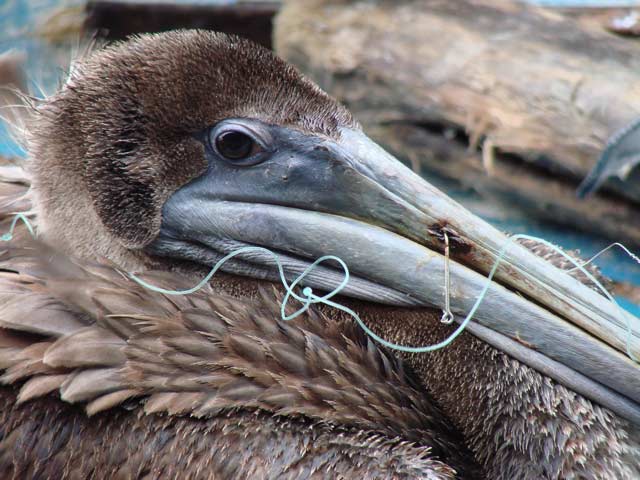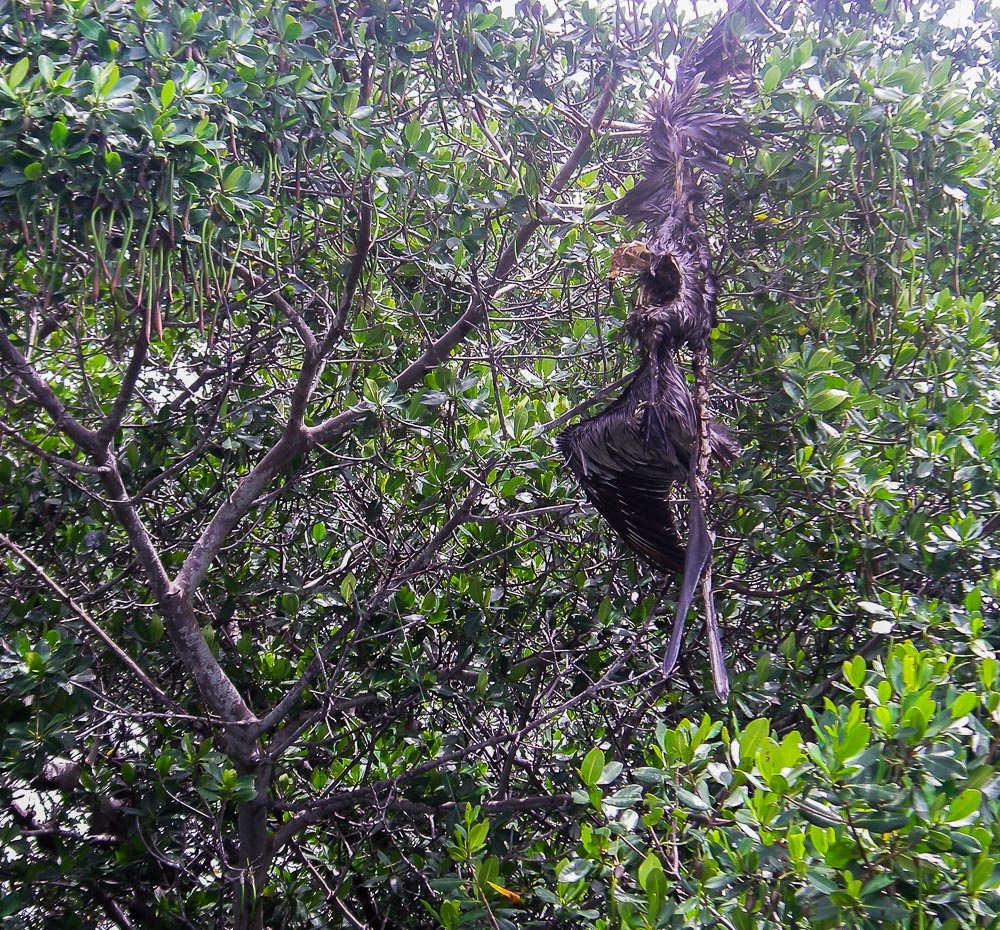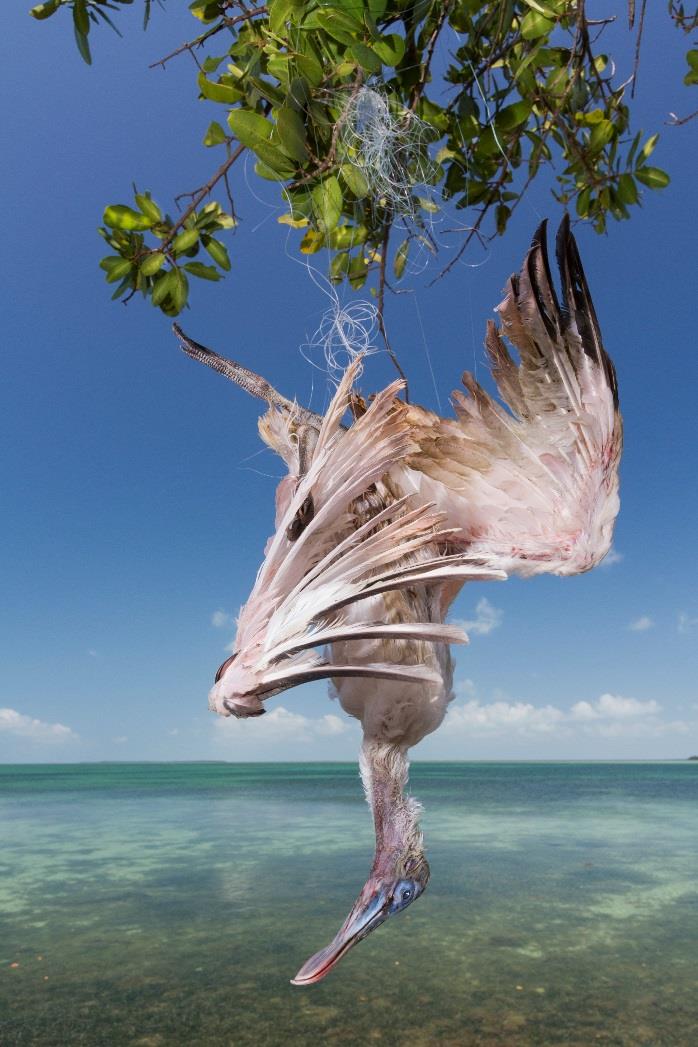A cloud of pelicans circling fishermen and begging for bait or leftovers from their filleted fish is an iconic scene across Florida. Unfortunately, it also can be a worst-case scenario for the birds, says Ann Paul, president of the Tampa Audubon Society (TAS).
cloud of pelicans circling fishermen and begging for bait or leftovers from their filleted fish is an iconic scene across Florida. Unfortunately, it also can be a worst-case scenario for the birds, says Ann Paul, president of the Tampa Audubon Society (TAS).
First, pelicans were not designed by nature to eat the bare bones of large fish, which can pierce their pouch or intestines, resulting in a slow and painful death. And then, if they survive eating the large bones, feeding them makes them accustomed to approaching humans, especially fishermen, where they are likely to become entangled in fishing lines. The lines later snare on the trees where they roost, trapping the birds and killing them from dehydration and starvation.
“There are many things that kill birds that we can’t change, but there are some easy ways to save them from these dying of entanglement in fishing line or internal infection from large bone punctures, which are leading causes of death for pelicans in Florida,” Paul said. “First, don’t feed pelicans, and then all of us can learn how to release a hooked bird.”
 A new video from TAS is the culmination of nearly seven years of work from volunteers who have trained hundreds of fishermen to successfully release hooked pelicans and other large birds. “Little by little, we are getting the message out,” said Sandy Reed, the TAS volunteer who has been spearheading the bird protection committee.
A new video from TAS is the culmination of nearly seven years of work from volunteers who have trained hundreds of fishermen to successfully release hooked pelicans and other large birds. “Little by little, we are getting the message out,” said Sandy Reed, the TAS volunteer who has been spearheading the bird protection committee.
The Florida Fish and Wildlife Conservation Commission (FWC) also has formed a Hooked Pelican Working Group to address the problem. “It’s not strictly pelicans which get snared by fishing line, though, we also see this happen to other birds like terns and loons,” said Becky Schneider, the conservation biologist leading the group.
“In addition, feeding pelicans – which is illegal – trains the birds to come to humans for food and leads to the birds becoming habituated to humans. Then they become more assertive, and they’re more likely to go after bait and tackle.” Pelicans instinctively focus on the injured fish, which they see as the one hooked on the line by the fisherman as bait for bigger fish.
 The best option to prevent birds from being entangled in fishing line is to never feed them, and to avoid casting near a flock of birds. But if a fisherman should accidentally hook a bird, here are recommendations to safely release it and save its life.
The best option to prevent birds from being entangled in fishing line is to never feed them, and to avoid casting near a flock of birds. But if a fisherman should accidentally hook a bird, here are recommendations to safely release it and save its life.
- First, do not cut the line. A long strand of fishing line snared to a bird will become entangled when it goes to its roost, dooming the bird to a painful, slow death. And the line may catch other birds at the roost, healthy birds just coming home for their evening rest.
- Recruit a friend to help.
- Protect your eyes with sunglasses or goggles.
- Reel in the bird slowly and evenly. Jerking the line will increase the bird’s injuries.
- Grasp the bird firmly, folding its wings gently against its body. Cover its head with a towel or shirt to calm it.
- Hold the beak firmly but slightly open so the pelican can breathe.
- Always remove the hook by cutting the barb first. If you can’t see it, push it forward then cut it off with wire cutters. Then safely back the hook out of the bird’s flesh. When dealing with a treble hook, cut all the barbs off the uninvolved hooks to prevent them from snagging the rescuer, too!
- Before releasing the bird, check it for other hooks or fishing line. Cut it free of any line or hooks.
- If the bird is not seriously wounded, release it by pointing it away from you and toward the water. Put the bird on the ground, step back, and let the bird fly away on its own. Do not toss the bird into the air.
- If the bird is seriously wounded or won’t fly, contact a nearby rehabber at https://ocean.floridamarine.org/SeabirdRehabilitators/
